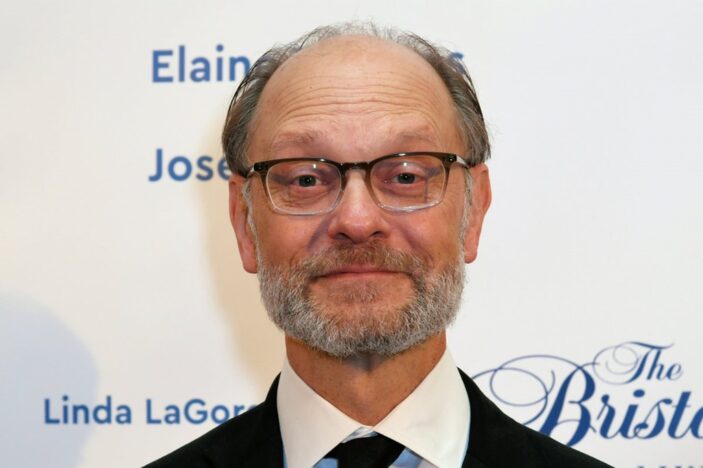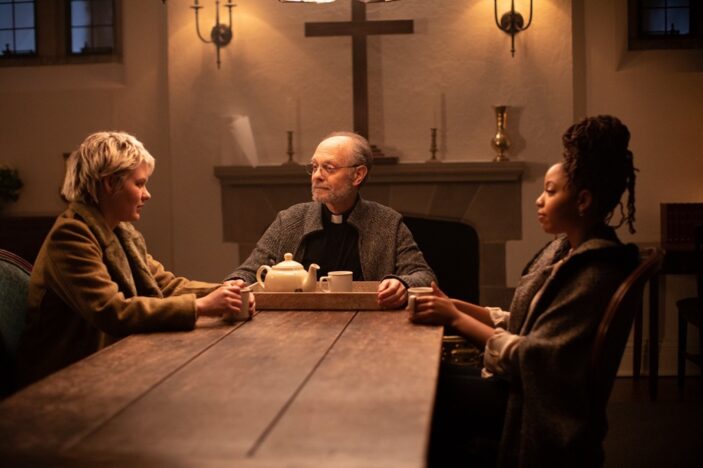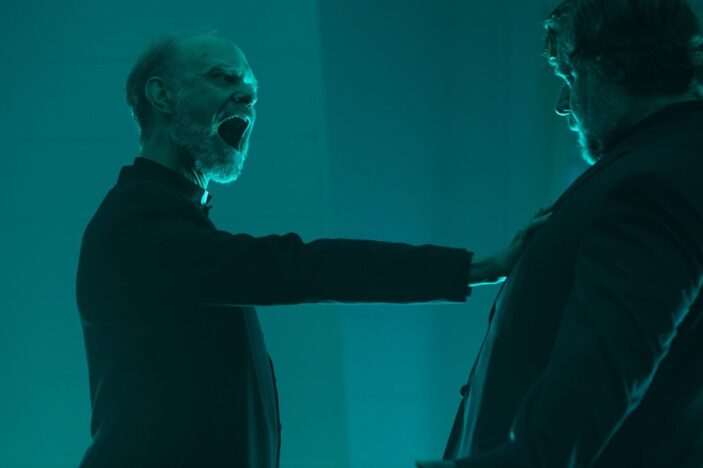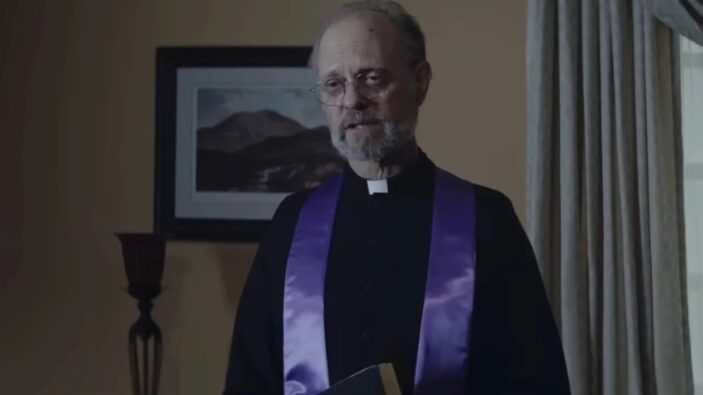
A staple of screen, stage and the small screen for five decades now, David Hyde Pierce is one of the most celebrated actors of his time, with his most recognised turn as Dr. Niles Crane on the acclaimed sitcom Frasier (1993 – 2004) lauding him four Emmy Awards and two SAG Awards.
His latest role, however, is as far removed from the neurotic psychiatrist as possible, with the actor turning from giggles to gasps in The Exorcism. In the film, Russell Crowe stars as a troubled actor who begins to unravel while working on a supernatural film. His estranged daughter wonders if he’s slipping back into his past addictions or if there’s something more sinister at play. Pierce portrays Father Conor, the priest assigned to guide and advise Crowe’s character throughout the shoot, who becomes dangerously entangled in the other-worldly forces that haunt the film set.
As the film possesses Australian theatres (you can read our review here), Peter Gray spoke with Pierce for the actor’s only Australian interview about how his theatre background and experience with live audiences helped inform his performance, working with Russell Crowe, and which specific horror films imprinted on him from a young age.
Before I get to The Exorcism, I just want to quickly shout out Down With Love. I had the pleasure of speaking to director Peyton Reed last year for Ant-Man and the Wasp: Quantumania and I had to express how much I love that film. It felt so very ahead of its time.
That is so cool of you to say that. I love that movie. I loved making that movie and working with Peyton. I was just talking to someone else about this, that it seems to be having a kind of resurgence. People are talking about it, or discovering it again. It sort of disappeared when we made it, so I’m thrilled that you liked it.
And I spoke to Joshua about this film too. Him having been an actor, as well as just the personal connection he has to this story, do you find that made him more accessible as a director? More than you may have experienced prior?
He was definitely accessible as an actor. And not only because of his personal connection with his dad, but he had written this script, so he had this great insight into the moments of what was happening. He was really seeing it. I have worked with directors who have been actors who weren’t necessarily the best directors. But in Josh’s case, he was a really great director.
With the horror genre, so many people that star in them don’t actually like them. What’s your relationship with horror films like?
(Laughs) Ever since I was a little kid I have loved them. Part of the draw of this was that I finally got to star in one.

I feel like we all see horror movies at too young an age. Was there a gateway title for you specifically?
I love that! Gateway horror. That’s exactly what it was. The ones I remember are the old Universal Frankenstein and Dracula (movies), particularly The Bride of Frankenstein, which I thought was such an incredible movie. Also the Hammer Horror Dracula movies with Christopher Lee and Peter Cushing. I was such a huge fan. I happened to turn on PBS and they were playing the silent Phantom of the Opera, and it had the music, and I just remember thinking, “What is this?” I was just completely mesmerised by that.
Did seeing that film also inform the theatre side of things for you?
I think it must have tapped into my theatrical sense, or my love of theatre. I’ve always been fascinated by death and that kind of moody, textured, richness of those movies. I loved the Bonnie and Clyde movie because of that Part of it might’ve been the violence, and I don’t really like slasher movies or those kind of horror movies, but there’s something so essential about life and death. Good and evil. All those things. I think it’s just very theatrical.
I think I read somewhere that Bonnie and Clyde was, in some ways, the first movie to really showcase quite graphic violence, with the characters being gunned down in the climax. It’s quite interesting to see it against even today’s standards.
It was, and it got criticism for fetishizing violence. But it was absolutely beautiful. That was the crazy thing about it. It was all in slow motion and just weird. Of course, people also talked about that the film basically made romantic heroes out of these two people that were, in fact, awful and killed innocent people. So, there’s that awkward thing.
Speaking of the beauty in the horror. I feel horror movies are often a really great vessel into exploring themes that are deeper. They may not be necessarily tethered to horror in the “traditional” sense, but this film deals with addiction and trauma and the exploration of working through that.
Yeah, boy. I think a lot of horror movies are placed in areas we are afraid of, like institutions or hospitals, you know? You’re right though, there’s this idea that people can be possessed by many different things. I think that’s one of the ways this film finds its way into the story, which I think is really interesting.
Films of this ilk tend to dabble in the notion of a person being possessed, and the oft-physicality that comes with that as an actor. Is that something easy for you to manoeuvre? Does it inform your performance with the attributes applied? Or you’re in the mindset of the character that the effects are little more than an additive?
Great question. I’m thinking of when you’re in the midst of a particularly possessed moment, let’s say. You mentioned special effects, and it made me think of the voiceover work in animated films I’ve done, because the way your voice embodies what the character is going through. Often it’s just you in a sound booth recording and you use your imagination to fill in what’s there, and I think that’s what happens if you’re in the position of going beyond yourself because your character is possessed. You imagine what the other technicians are ultimately going to do to enhance you in one way or the other. However they do it, whether it’s physical, visual, makeup effects, or post-CGI…but that’s where you find the inspiration for wherever you go.

Do you think having a theatre background and working with a live audience has helped with your horror movie stamina?
(Laughs) Vocally, you mean? Yeah, absolutely! It’s very helpful, especially if you’ve got multiple takes or something. You have a sense of how to use your voice, which you learn in the theatre. If you’re going to do eight shows a week, and you’re singing in a musical, or whatever it is, you’ve got to figure out, or be taught, how you can do that safely and sustain it.
I will just quickly say, because I believe you’re about to star in The Pirates of Penzance?
I am!
I saw the Australian production when I was younger, and it’s one of the greatest shows I have ever seen. I’m very excited to see what you do.
Oh, cool. I love hearing that. That’s so neat. I love that you have that memory. I have memories like that, too. (Stage productions) can really make a difference.
And on the mention of Australia, you have one of our countrymen, Russell Crowe, in this film. When I was speaking to Joshua, he said that Russell was like the “cool kid” that went to the party and then everybody else wanted to go to the party because of him. How did you become involved in the film?
They sent me the script, and Russell was already attached. That was the information I had, but if I had not liked the script, or if I felt that the part wasn’t good for me, I wouldn’t have done it. But the fact that Russell was part of it, and I so admire him as an actor, that opportunity (to work with him) was certainly part of the package. I was thrilled to be able to work with him.
Were you aware of Joshua’s personal connection, with his father being in The Exorcist, prior to signing on?
I was aware of it at the time. And it was made me interested in doing the film. It’s not just this connection, but this personal insight that he had in creating this world. He had reasons for doing what he did in each place, because there’s this deep bench of experience he had from his dad. It made it very enticing.

Does that deep, personal connection from him add any pressure to you performing in the film?
I think because I’ve had to that (before) where I was playing a historical person. I did a movie, Nixon, with Oliver Stone, where I played John Dean, and I felt a great responsibility to do him justice. In this case, because Josh had created a different story influenced by The Exorcist, we weren’t playing actual people. I didn’t have that pressure. And the thing that really took the pressure off was, in some ways, I’m playing the Max Von Sydow character from The Exorcist.
When I watched (the film) I thought, “Well, I’m not Max Von Sydow.” I wish that I was the actor he is, but I’m not, So this is going to be something different. They didn’t cast James Cromwell, or someone like that, and I think that would have been a more closer map. So, I figured it was going to be my own take (on the character).
I feel like we all have our relationship with The Exorcist, as a film. Do you remember the first time you saw it?
The first time I saw it, it would have been on television, so I’m guessing it was heavily edited. But I had read the book. The book is the thing that did me in. It scared the pants off me. Just so chilling. Then and now. And when I went back to watch The Exorcist to research this film, it still holds up. It was still so terrifying. And what I thought was so brilliant about The Exorcist, I just remembered this, and there’s a connection with The Exorcism as well, is the most terrifying thing was when they are at the doctors testing her for what could be wrong. I found that (sequence) absolutely chilling.
And I thought what brilliant filmmaking it is in a movie that’s classified as horror to show this other side. I think the same thing happens in our film. You have these psychological issues and addiction issues. Parent and child issues. And they are as terrifying and as heart-ripped as the demonic “possession” scenes. I love that that’s in the film. It gives these different perspectives to what it means to be possessed.
If you could tell an “inside baseball” narrative, so to speak, about one of your own filmmaking experience, would you want to write or act in a behind-the-scenes version of anything?
Behind-the-scenes of anything I’ve done? I don’t know. I mean, I wouldn’t say no. It’s not a terrible idea. I’ve done so many things, so I’m just trying to think what that would be. I think people in the business love those stories about what happens here and there, but regular audiences are, like, “Okay, well, where’s Beyoncé?” (Laughs). I don’t know. It’s possible.
I had such a great time talking to Joshua, and he was so very open about the process of making the film and that he had fight for certain narratives to remain, one of them that the two main female characters are queer. It’s something I really responded to, because their sexuality had nothing to do with their character or actions. It’s a small thing, but it’s nice to see in a film like this that such characters are treated equal and aren’t defined by that identity.
I completely agree. I think the fact that it wasn’t a focus. It wasn’t making a statement. They were two characters, they fell in love, and life goes on. Meanwhile, there’s a demon in the other room (laughs), but, you know, I agree. I think that’s hopefully where we will continue to go.
The Exorcism is now screening in Australian theatres. It is scheduled to be released in theatres in the United States from June 21st, 2024.
